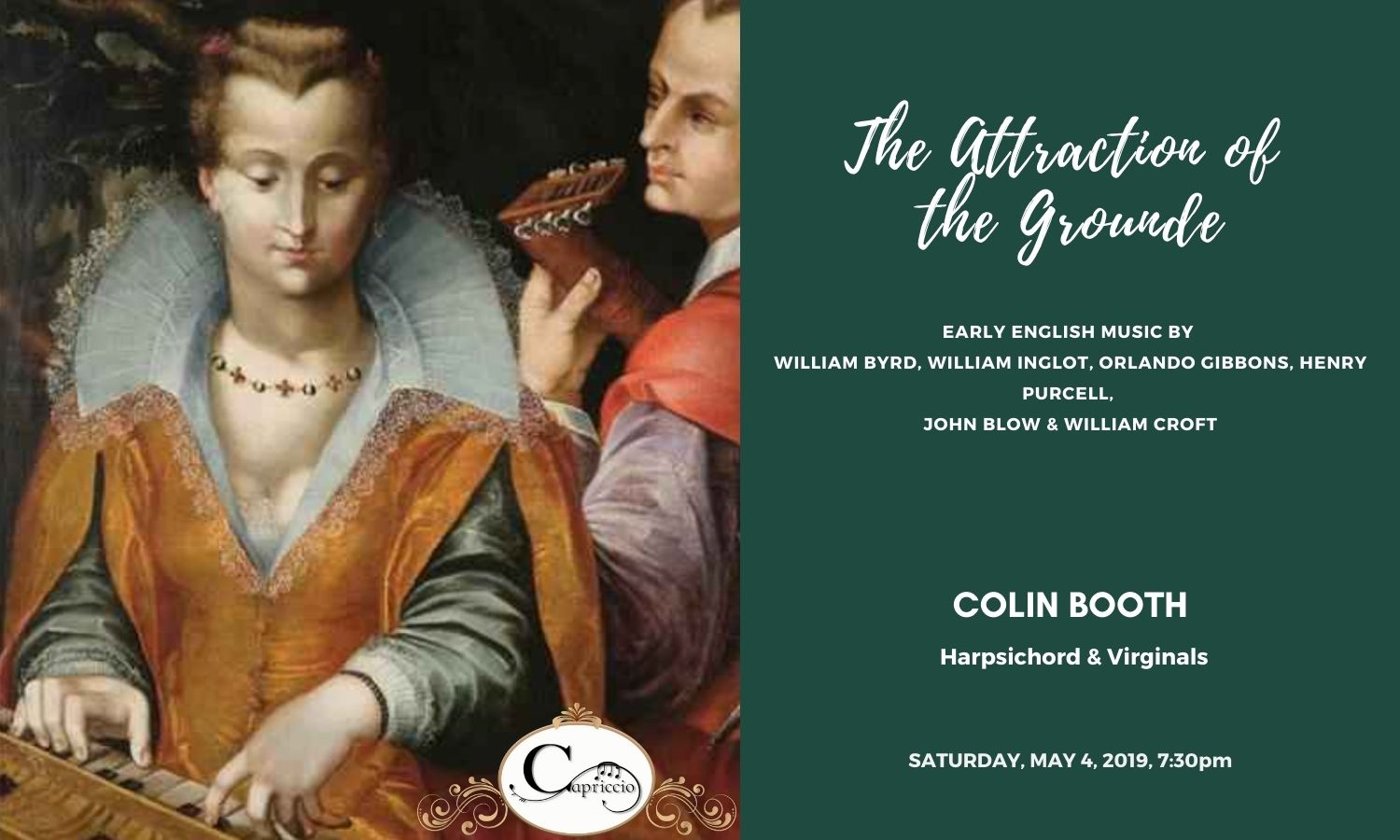COLIN BOOTH – ‘THE ATTRACTION OF THE GROUND’

Venue:
Schedule
THIS CONCERT IS SOLD OUT.
Colin Booth’s second concert with Capriccio is a delightful exploration of a musical form, the Ground, which was immensely popular in the 17th century. A Ground is essentially a set of variations built around a repeated bass line that often comprised just a few notes. Revel in the lovely melodies & great diversity of English 17th century Grounds with works by William Byrd, William Inglot, Orlando Gibbons, Henry Purcell, John Blow & William Croft.
THE ATTRACTION OF THE GROUNDE
PART ONE
Anon
Upon La mi re
William Croft (1678 – 1727)
Suite 13 in G: Ground; Minuett
Orlando Gibbons (1583 – 1625)
A Grounde
The Italian Ground
John Blow (1649 – 1708)
Suite 2 in D Minor: Ground; Hornpipe
Mortlack’s Ground
William Croft
Suite in A – Ground; Minuet
Henry Purcell (1659 – 1695)
Suite in G minor: Prelude; Almand; corant; sarabande; aire.
A Grounde in gamut
A New Irish Tune
PART TWO
William Inglot(dates uncertain)
The Leaves Bee Greene
William Byrd
A Grounde
My Ladye Nevels Grownde
William Croft
Suite in C minor: Prelude; Allemande; Courante; Sarabande; Ground; Aire; Hornpipe; Minuet.
Henry Purcell
Ground in D minor
Round O (from Abdelazar)
A Note on the Music: The Ground – or Ground Bass (tautology, really) – is an elementary form of variation. Early examples which were used throughout Europe as a basis for composition were the Passacaglia bass (four descending notes), the Chaconne or Ciaccona, and La Folia, which was slightly more intricate. The name “ground” was the general English term. The form permeated 17thcentury English music, and survived into the 18thcentury, being used to powerful effect by Bach and Handel, and was still used by composers in the 20thcentury. Vaughan Williams, for example, ended his 5thsymphony with an elegiac passacaglia.
A ground consists of a repeated bass pattern, which can sometimes be just a few notes and sometimes a whole line, or two lines, as in the examples by Byrd, Blow and Croft.
The most famous of all from this period, and one of the most subtly disguised, is Purcell’s masterly “When I am laid in earth” – the concluding song from Dido and Aeneas. But Purcell found it an invaluable convenience in his music, throughout his short life.
The aim here is to show the great variety of style and mood which grounds could encompass. But an entire concert consisting of grounds, however varied, would probably be a “surfeit of peaches”. So this programme places the ground in context. In the suites by Blow and Croft, these composers did this themselves, by making an extended ground the principal movement of a short keyboard suite, and simply adding a short, more vigorous piece to complete it. A hundred years earlier, of course, Elizabethan masters did not have a suite to use, since it had not yet been invented, but their grounds are impressive enough to stand by themselves.
Colin Booth has combined the careers of harpsichordist and harpsichord-maker for 40 years. As maker, he has more than 300 customers to his credit, including a large number of Early Music professionals.
As a player, Colin has performed as soloist and continuo harpsichordist in a number of countries, from Denmark to South Africa. He taught and played annually for 25 years at the Dartington International Summer School, and has recorded 12 CDs of solo harpsichord music.
Colin’s extensive recordings, which include many important recordings of early English composers, have met with considerable acclaim. His most recent recording is of music by the great Elizabethan master William Byrd, The Melodious Birde – Keyboard Music by William Byrde played on three different and appropriate instruments from his workshop. Other recordings of early English composers include Peter Philips – The English Exile; Purcell – The English Orpheus; and William Croft Keyboard Music. Colin is currently preparing a 4-CD complete recording of Bach’s Well Tempered Clavier, which follows on from his earlier Bach recording of the Goldberg Variations. Colin has also authored an important book for players of Baroque keyboard music – Did Bach Really Mean That? – Deceptive Notation in Baroque Keyboard Music.
BBC Music: About Peter Philips – The English Exile: “For delight in sheer harpsichord sound, this disc is hard to beat.”
Lyndsay Kemp, Gramophone: About Grounds for Pleasure: “The success of Booth’s performance …stems from tempi which take time to enjoy not just the harpsichord’s tone but the richness and lyricism that is there in the music.”
Richard Turbet, world authority on William Byrd: About The Melodious Birde: “…the disc’s selling point rests upon the quality of Booth’s musicianship. …his version of the often-recorded Pavan and Galliard pairing dedicated to ‘Ph. Tr.’, a particularly intense work even by Byrd’s standards, is the finest on disc.”
